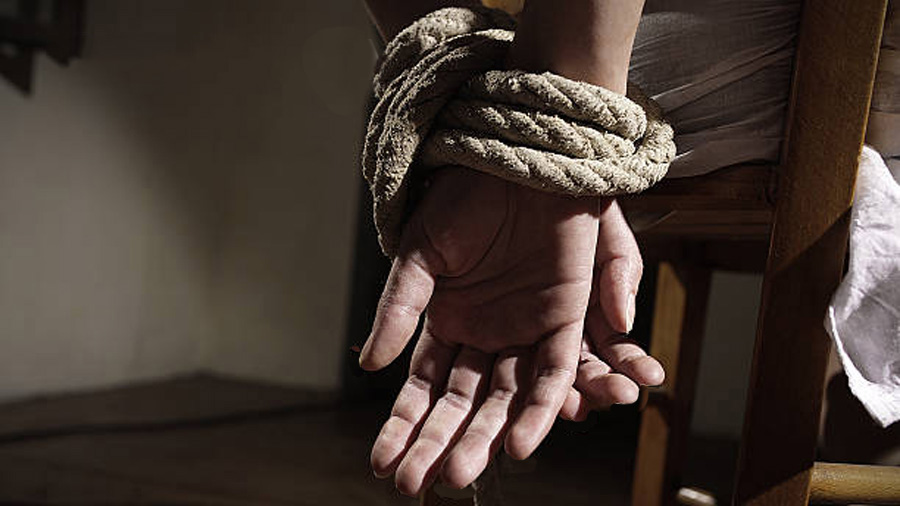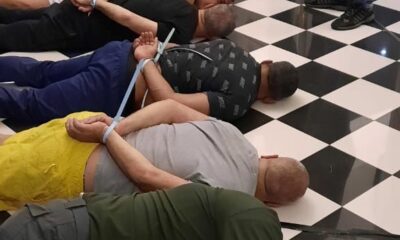
Banner

Kidnapping ordeal spotlights dangers of online dating
A Johannesburg man is “lucky to be alive” after being kidnapped and brutally beaten for nearly three days when a person he met through an online dating app turned out to be a vicious scammer.
Shayne Kaplan, 45, is a single, shy, slender-built man who has always battled to make friends. He works in the accounting profession and belongs to a crochet group that meets every so often. He turned to Tinder in October to connect with someone and possibly begin a friendship.
The person he met online last month, he said, “seemed decent”, so he agreed after a few days of communicating with him that they should meet. “He didn’t ask for money, taxi fare, or airtime, which I believe to be red flags, he just seemed nice,” said Kaplan.
Never in his wildest dreams did he think that this potential match would turn into a nightmare.
Kaplan has agreed to share his ordeal in the hope that it will act as a warning to others of the potential dangers of online dating.
“I’m hoping my story will save people from going through this trauma,” he said, after spending two weeks in intensive care while doctors battled to save his right eye injured during the ordeal.
Kaplan agreed to meet the man on Saturday, 22 October in Denver, an industrial suburb in eastern Johannesburg. He told his mother, with whom he lives, that he would be home in a few hours.
Soon after meeting, they drove to a shack nearby where all hell broke loose.
“Within seconds, about five men entered the shack, tied me up, and told me it was a robbery. I feared for my life,” said Kaplan.
They demanded his wallet and bank cards, which he did not have on him, and then proceeded to search his phone for his banking apps, demanding his secret pin codes. “They soon started transferring money out of my account,” he said.
The following day, he said he was beaten for not providing a password for a different account, which he said he didn’t know.
“They beat me with a wire hanger, tried to strangle me with it, I think I passed out three or four times,” he said.
“They said they would let me go, but after a while, I started to lose all hope, thinking that I wasn’t going to get away. I davened to G-d to get me out of there. I was anxious about my mother and my family, whom I knew would be worried.”
When he didn’t return home on Saturday evening, his mother contacted Kaplan’s brother, Peter, who frantically tried to reach him on his cell phone.
“It was out of character for my brother,” he told the SA Jewish Report.
Eventually the Kaplans received a text message saying that Shayne would come home on Sunday. “When he still didn’t arrive, we decided to go to the police to report him missing,” said Peter.
He said the family was given the run around by Shayne’s kidnappers, believing him to be in the Heidelberg area. “We soon realised this was just a decoy, and remained in the dark about his whereabouts,” said Peter.
Eventually, the family reported the matter to the Community Active Protection (CAP). CAP deployed its special operations unit, field tracing unit, and intervention unit as part of a multidisciplinary team involving members of the Community Security Organisation to locate the victim and suspects. Information received by its operations teams “led the team to the Johannesburg CBD, where the victim was found”, CAP said.
They found Kaplan in his car shortly after he had been released by his attackers on Tuesday morning.
“I didn’t know where I was, I was disorientated. If it wasn’t for CAP, I don’t think I would have made it home,” Kaplan said.
Hatzolah got him to hospital, where he underwent two surgeries to repair his eye.
Kaplan said the incident had scarred him. “People must be careful who they speak to on social media and not be too trusting. They should really know somebody before agreeing to meet them in person, and rather meet someone in a public place,” he said.
“I blame myself for this. I didn’t see his urgency to meet me as a red flag. It has made me feel like I can’t trust anyone anymore. I’ve seen the cruelty that people are capable of, the lack of respect for a human being, and the lack of remorse.”
“Online dating is one of the most popular ways to meet a potential partner and form relationships,” said clinical and forensic psychologist, Pam Tudin, who is also the founder of Klikd, which provides resources for parents, teachers, tweens, and teens to navigate the digital landscape.
“We know 50% of people are trying online dating as a way to connect. What we also know is that $1 billion [R17.2 billion] has been scammed by online scammers on dating platforms in the past three years,” she said.
“We have to question what’s driving our need to connect to people online. Obviously, loneliness and a need for a relationship are a huge part of it. What we can do in the face of that loneliness is have a measured response and ask other people for their input. Meet the person sometimes with a friend so that you can gauge together what your response is so that you aren’t so clouded by the wood-for-the-trees factor,” she said.
Scammers vary from romantic scammers, in which the romance feels so real, intense, and intimate, it opens the person to the possibility of financial fraud, to crypto scammers, sextortion scammers, and fishing scammers.
“At best, you’ll be left embarrassed and at worst, you can lose a lot of money or be physically harmed,” Tudin said.
She advises people not to give away too much personal information online.
“Do a quick Google search of their photos, do a Google reverse-image search to make sure you’re not coming up with a too-good-to-be-true Vogue model image that doesn’t belong to the person. When you decide to meet the person offline, always ensure it’s in a public place and meet more than a few times to get a true sense of the person,” she said.
“If they start talking about needing money or some sort of help, or having a medical emergency, that’s a red flag.”
A case has been opened at the Cleveland Police Station. The investigation is ongoing and no arrests have been made yet.










